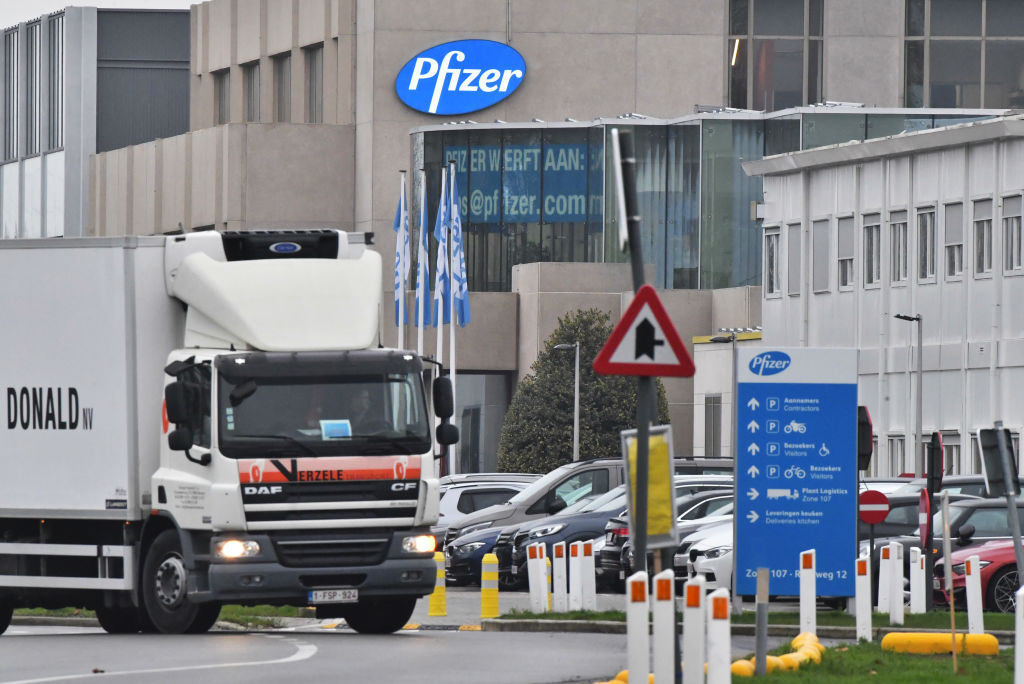
Pfizer scaled back its Covid-19 production targets earlier this year after the drugmaker ran into difficulties securing all the materials it needs to produce the shots at a large scale.
In news releases through September, Pfizer had said that it aimed to manufacture up to 100 million vaccine doses this year. But in several releases in November, the company cut that to an estimate of up to 50 million doses. Pfizer is developing its vaccine with Germany-based BioNTech SE.
A Pfizer spokeswoman said in a statement Thursday that multiple factors slowed the company down, including the time it took to source large quantities of the raw materials needed to produce the shots. But the company said it has finished bringing its manufacturing up to scale and it is now producing vaccines at a rapid pace.
“Scaling up a vaccine at this pace is unprecedented, and we have made significant progress as we have moved forward in the unknown,” said spokeswoman Amy Rose. In particular, she said, “scale up of the raw material supply chain took longer than expected.”
Modifications to the vaccine production lines in both the U.S. and Europe are now complete, Rose said.
“Finished doses are being made at a rapid pace,” said Rose. “We are confident in our ability to supply 1.3 billion doses by the end of 2021.”
Earlier, the Wall Street Journal reported that supply-chain problems caused the New York-based drugmaker to reduce the number of vaccines it expects to ship worldwide this year. That led Pfizer shares to fall as much as 3.1% and caused the wider stock market to dip. The S&P 500 ended Thursday’s trading down 0.1%.
The two-shot vaccine, based on a technology called messenger RNA, was cleared for use by U.K. regulators this week, and has been submitted for an emergency-use authorization from the U.S. Food and Drug Administration. A 44,000-participant clinical trial showed the shot to be 95% effective in preventing symptomatic Covid-19.
While Pfizer is confident it has the materials it needs, the report Thursday was a reminder that the world is depending on mass manufacturing at an unprecedented speed and scale to end the pandemic. Any hiccup in the process could delay the onset of the global economic recovery.
Moderna Inc., which has also submitted a messenger RNA-based vaccine to the FDA for emergency clearance, said in a statement on Thursday it would have between 100 million and 125 million doses available globally in the first quarter of 2021.
Operation Warp Speed Chief Operating Officer Gus Perna has said that the U.S. will distribute 40 million vaccine doses total by the end of the year, enough for 20 million people.
The U.K. pre-ordered 40 million doses of the Pfizer vaccine. On Nov. 4, five days before Pfizer cut its manufacturing target, Kate Bingham, chair of the U.K. Vaccine Taskforce, said 10 million could be delivered by year-end.
On Thursday, Health Secretary Matt Hancock said an initial batch of 800,000 doses will be administered starting next week, and that it was “not unreasonable” to expect 5 million by year-end — suggesting the U.K. has already lowered its expectations of how much Pfizer can deliver this year.
–With assistance from Riley Griffin and Alex Morales.
More Must-Reads From TIME
- The 100 Most Influential People of 2024
- Coco Gauff Is Playing for Herself Now
- Scenes From Pro-Palestinian Encampments Across U.S. Universities
- 6 Compliments That Land Every Time
- If You're Dating Right Now , You're Brave: Column
- The AI That Could Heal a Divided Internet
- Fallout Is a Brilliant Model for the Future of Video Game Adaptations
- Want Weekly Recs on What to Watch, Read, and More? Sign Up for Worth Your Time
Contact us at letters@time.com